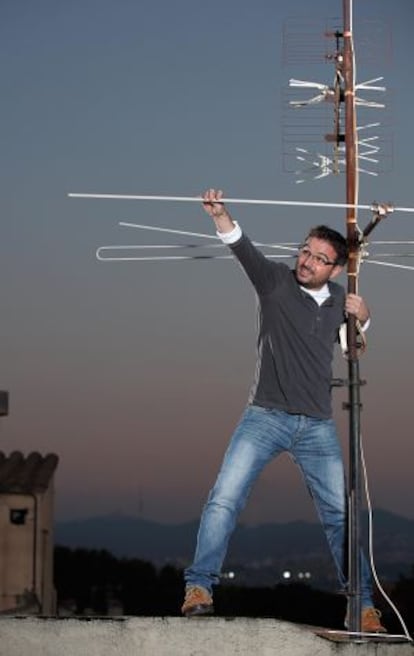Jordi Évole: A voice that breaks the silence
The satirist’s show about the Valencia Metro tragedy has shown him to be a peerless investigator


Satirist Jordi Évole began his meteoric rise on Spanish television as El Follonero, the amusing troublemaker who appeared on Andreu Buenfuente’s late-night chat show. After heading out on his own, he gradually transformed himself into the director-presenter of one of the best investigation programs on TV. And probably the zenith of his career so far came several months ago with the episode of his show Salvados about the 2006 Valencia metro accident that killed 43 people and left 47 others injured.
Broadcast on La Sexta on April 28, 2013, “Los olvidados. Metro Valencia: el accidente silenciado” (or, “The forgotten ones. Metro Valencia: the silenced accident”) was an in-depth report on the causes of the derailment and the deplorable behavior of Valencian politicians and jurists who tried to cover up what happened ahead of Pope Benedict XVI’s imminent visit to the city.
The program had enormous repercussions, not only breaking audience records for the show at the time (3.3 million people tuned in to watch it) but also several days later uniting 5,000 people in Valencia’s Plaza de la Virgen in solidarity with the association of victims of the tragedy. In January 2014, nine months after its broadcast, judges decided to reopen the investigation into the accident. The Valencia provincial court stated that there “new elements” had come to light that could “make the continuation of the investigation into the case useful.” It also partially accepted the appeals against the shelving of the investigation into the accident in 2008. In September 2013, Judge Nieves Molina had refused to reopen the proceedings, convinced that the accident was caused by the excessive speed of the train.
A number of unforgettable scenes, awful statistics and devastating testimonies stay with you from Évole’s program. The behavior of Juan Cotino, current speaker in the Valencia parliament and a strongman in the conservative Popular Party for decades, is perhaps the best example of political shamelessness ever seen on TV. His absurd smile during the brief stroll he shares with Évole, his refusal to answer any of his questions, and the viewer’s prior knowledge of his disgusting behavior with the victims’ families by offering them perks in exchange for their silence, placed him on the edge of vileness.
A number of unforgettable scenes, awful statistics and devastating testimonies stay with you
The program won numerous awards in Spain and Évole even had an article dedicated to him in The New York Times, headlined “Crusading Spanish Broadcaster Gives Voice to Ordinary Citizens,” which described him as “a prominent Spanish voice at a time of economic crisis [ …] At a time of record 27 percent unemployment, and as nearly every Spanish institution has found itself entangled in corruption cases, Mr. Évole has had plenty of low-hanging fruit to pluck. But for other stories, he has dug deeper, examining pre-crisis events such as the Valencia crash.” Évole had reached a peak in his field of journalism.
After the program we knew many more things about the tragedy. We knew that in 2006 the regional public rail firm Ferrocarrils de la Generalitat had hired a consultant to coach the technicians who had to appear before the Valencian courts with the sole aim of arguing that what had happened had been an “inevitable accident.” We also knew that consulting firm HM & Sanchis was hired for no less than €621,000 – money that came out of the public coffers – and that Cotino has a predilection for cropping up in almost every murky issue, from the massive Gürtel kickbacks-for-contracts corruption case and illegal party financing to dealings with under-investigation businessman Enrique Ortiz.
But the importance of Évole’s program goes beyond its specifically informative aspect. It is an essential document for understanding citizen solidarity and the behavior of not only a certain atrophied political class, but also a section of the judiciary that is completely insensitive, and a media that is subject to power to the point of servility.
Évole’s triumph is closely linked to his concept of journalism in which the reporter shows a certain empathy with citizens. He puts himself in their place and asks what, in his judgment, they want to know. And he does it with an attempted, or authentic, simplicity. He doesn’t listen to himself when he talks, nor does he theatricalize his questions: he is direct.
Évole is human and, thus, he has also made mistakes. From a journalistic point of view, he let construction magnate and Real Madrid president Florentino Pérez escape unscathed, while Operación Palace, his fake documentary about the February 23, 1981 attempted coup d’etat in Spain, offered a complex mix of ingenious script, the surprising participation of some big names, and a more than questionable taste for wisecracks. But there is no doubt that it was also one of his most successful and talked-about shows, seen by 5.2 million people.
Évole has become one of Spain’s most valued presenters. According to a Personality Media poll last July, he had an approval rating of 7.4 out of 10 and a 90-percent recognition rate among the 40,000 people surveyed. No doubt thanks to his tendency to not mince his words and asking politicians the questions that few others ask them.







































